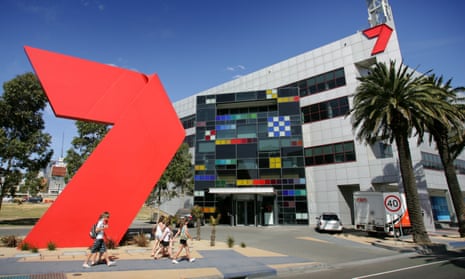The Morrison government has suspended a raft of local content obligations and tipped an extra $54m into Australia’s television, radio and regional publishers in an attempt to shore up news outlets struggling with the economic impacts of Covid-19.
The communications minister, Paul Fletcher, announced on Wednesday that Australian drama, children’s and documentary content quotas on free-to-air and subscription television would be suspended for 2020, although the requirement for 55% Australian content overall remained.
The federal government will also provide a 12-month waiver of spectrum tax for commercial television and radio broadcasters, at a cost of $41m, and invest $50m in regional journalism, of which $13.4m is new money.
Labor has welcomed the package but accused the government of being slow to respond to industry demands for support, which predate Covid-19.
The media industry has been hammered by falling advertising revenue during the coronavirus crisis, prompting the suspension of printing of local community titles by Australian Community Media and News Corp Australia. Seven West Media is considered particularly at risk due to $683m of debt.
Despite rebuffing calls to abolish content quotas and cut TV licence fees as recently as November, Fletcher extended an assistance package based on those measures on Wednesday.
He said the government was offering “urgent short-term support” to the media sector because it was “doing it tough” and in recognition of the fact “public interest journalism is essential in informing and strengthening local communities”.
He explained that content obligations had been suspended because Covid-19 had “effectively halted production of Australian screen content”.
In addition to $51m in spectrum tax rebates, the government will create a $50m public interest newsgathering program for commercial television, newspaper and radio businesses in regional Australia.
The bulk of the funding for the program – $36m – will come from “repurposing unallocated funds” from the undersubscribed regional and small publishers jobs and innovation package.
In its digital platforms inquiry, the Australian Competition and Consumer Commission recommended that the government restructure regional media grants, after criticism that the first round of “innovation” grants was too restrictive.
Quick GuideHow to get the latest news from Guardian Australia
Show

Email: sign up for our daily morning and afternoon email newsletters
App: download our free app and never miss the biggest stories
Social: follow us on YouTube, TikTok, Instagram, Facebook or Twitter
Podcast: listen to our daily episodes on Apple Podcasts, Spotify or search "Full Story" in your favourite app
Guidelines for the new program would be released “in coming weeks”, Fletcher said, promising it would be “available to a wider range of organisations” than the earlier program, negotiated under a deal with the Nick Xenophon Team to loosen media ownership laws.
Fletcher also released an options paper by Screen Australia and the Australian Communications and Media Authority proposing “harmonising regulation to support Australian content” – which could see online streaming services like Netflix and YouTube forced to produce Australian content, in line with a recommendation from the digital platforms inquiry.
“Regulated free-to-air broadcasters are competing with unregulated digital platforms and video streaming services,” Fletcher said. “It has been evident for some time – and the Covid-19 crisis has made it even more obvious – that this is not sustainable.
“These arrangements threaten the sustainability of television broadcasters – and in turn the sustainability of the film and television content production sector.”
The Labor communications spokeswoman, Michelle Rowland, said the package was “an admission of deep failure by this government, now in its seventh year”.
“Australian media was already in crisis before Covid-19,” she said. “For years Labor has been calling on this government to overhaul the policy and regulatory framework and implement a real plan to support Australian content, public interest journalism and regional media in a landscape transformed by digitisation and convergence.”
Rowland said the package was “also an admission the Nick Xenophon-inspired regional and small publishers innovation fund is the failure Labor warned it would be, back when it was announced in 2017”.
“The government has only itself to blame for the poor results and wasted time.”
The Greens communication spokeswoman, Sarah Hanson-Young, said the government had failed “to offer any real relief” to the arts and entertainment industry, and relaxation of local content quotas “will in fact make things worse for many thousands of artists and entertainers who have already lost their jobs”.
